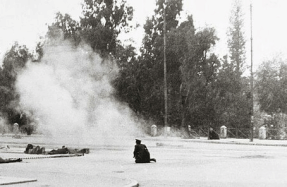LITTLE BIGHORN


In 1876, after violating an earlier peace treaty with the Plains Indians, the United States Army sent a force to the Midwest to conquer the increasing number of nomadic natives who did not want to live on designated reservations.
The ensuing conflict culminated in the Battle of Little Bighorn, where the US soldiers, under the leadership of Civil War veteran General George Armstrong Custer, were overwhelmed and killed down to the last man. A spectacular loss for the US Army and a stunning win for the combined Lakota Sioux, Northern Cheyenne and Arapaho tribes, the battle remains one of the most significant events of the wider Sioux Wars.
The battle was part of an ongoing series of hostilities triggered by relentless white American expansion westwards through indigenous ancestral lands. With most Native Americans either dead or forced onto reservations, after centuries of abuse the Great Plains Indians were the last remaining nomadic communities left.
However, their victory at Little Bighorn proved a double-edged sword: the decisive win over Custer’s men only strengthened the United States’ resolve. Utilising their greater resources and firepower, within a year the US Army would force the remaining Native Americans to surrender, taking the Black Hills by force and without any compensation.
From civil war to conquest of the west
When the American Civil War broke out in 1861, white settler expansion to the west ground to a halt, allowing the Great Plains Indians a period of reprieve. By this point, through warfare and over-hunting, white settlers had either killed off most natives or forced them to abandon their nomadic lifestyles for life on the reservations. The one last bastion of freedom spanned the Northern Great Plains of Dakota and Wyoming, where the Sioux and Cheyenne tribes had been forced by western expansion, in turn displacing the local Crow tribes.
During the Civil War a gold rush broke out in Montana, leading to the development of a trail straight
You’re reading a preview, subscribe to read more.
Start your free 30 days





